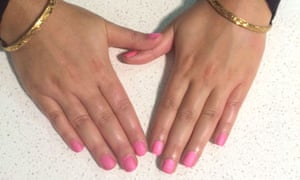Nail symptom: They’re concave enough that a drop of water wouldn’t roll off them.
The technical term: Spoon or scooped nails
The no-big-deal explanation: Nails can take on a hollowed-out look with normal aging.
Why you should get it checked out anyway: Iron disorders like iron-deficiency anemia are the most common cause of spoon or scooped nails, says Dana Stern, MD, a board-certified dermatologist and nail specialist in New York. Your doctor will likely do a blood test to check your ferritin (iron) levels, as it’s possible that your nails would be the first sign of the problem, says Chris Adigun, MD, a fellow of the American Academy of Dermatology and a nail specialist in Chapel Hill, North Carolina. (That doesn’t mean that all cases of anemia cause spoon or scooped nails, though—other symptoms include fatigue, lightheadedness, pale skin and headaches.) Another, less common, possibility is that you’ve got a thyroid issue. Either way, your nails should return to normal once the underlying cause is under control.
Nail symptom: Vertical brown or black bands
The technical term: It depends (see below)
The no-big-deal explanation: Pigmentation in nails is very common, especially in people of color, says Stern. Regardless of your skin color, though, if you’ve had the band for a long time and it hasn’t changed, or you have bands on multiple nails, there’s little reason to worry. Even new bands can be the result of a trauma activating the pigment-producing cells in your nail, like an overly zealous manicure, medications like antibiotics or blood pressure meds, or even pregnancy. It could also be a mole or freckle, though those are more common in children.
Why you should get it checked out anyway: Stern estimates that in less than 3 percent of cases, these bands are actually a melanoma growing in your nail. (All the more reason to remove your nail polish before you get a skin-cancer screening.) Melanomas are more common on the thumb and index finger (experts aren’t sure why) and usually only occur in one nail. If the pigment starts leaching out onto the surrounding skin, that’s a sign that you need to see your doctor now, says Stern, because it means the tumor is growing.




